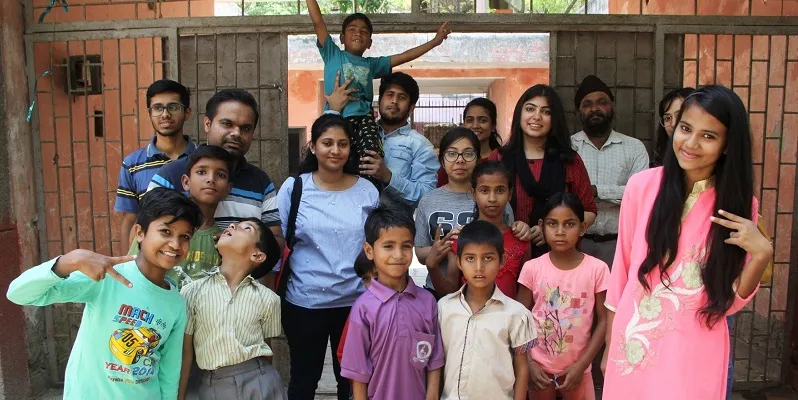Youth volunteerism: a journey that makes ordinary youngsters extraordinary humanitarians
On this International Youth Day, a look at how volunteering changes the worldview of the young – how it shapes their perspective and prepares them better to take on the challenges the future holds for them.
The latest Census data (2011) shows that one-fifth of India’s population is made up of the youth. This means that one-fifth of the 1.2 billion that call India their home is of the age group between 15 and 24 years, and by 2020 the statistic will change to one-third. It would not, then, be incorrect to call our country a nation of the youth.
We have a tendency to romanticise youth. That often makes us overlook the challenges a large section of our youth face – from social exclusion and ageism, to gender-based violence and the lack of access to rights and opportunities. Add to that the volatile nature of the age, affected by a multitude of physiological and psychological changes. A worrying percentage of the youth deals with life-threatening experiences like depression, suicidal tendencies, and other mental health problems that alter their entire belief systems.

Photo credits: Gayathri Satish (CRY volunteer)
Volunteerism often helps channelise the nervous energy that results from all these changes that the youth experience into the right direction – into constructive rather than destructive forces.
Seize the day
We have also often heard that it is what we do in our youth that shapes the way our life pans out. Needless to say then, if the world’s largest young population starts focusing on becoming more socially aware and responsible, our country would be in very safe hands. It is this social awareness and responsibility that is the biggest gift volunteering offers to the young. Being engaged to a social cause as a volunteer thus makes a young person feel more socially inclusive and becomes a pivotal milestone in the way they look at giving back to the community, be it in big ways or small.
This feeling comes to me not as a person who spent over two decades at an organisation working with child rights. It comes to be from being a passionate development professional who has worked and dealt with intricacies of volunteering. Having watched volunteers as closely as I have, I know how volunteering contributes to making life purposes more meaningful. In fact, my journey with CRY – Child Rights and You, started as a volunteer when I was 24. And every minute of this journey has only strengthened my belief.
Mine is the story of a privileged young woman who grew up in a socially conscious home discussing issues like the deep-rooted caste system, or the patriarchal nature of our society, and a burning desire to bring change, in whatever way possible. My access to education and my family’s belief in equity made me a firm believer in inclusion and rights. And soon, all roads led to CRY, where I took up volunteering, quitting a full-time job in a grass roots level NGO.
Life-changing, meaningful work
Volunteering at CRY was not just about working directly with underprivileged children and creating an enabling environment for them. My life changed in ways I never had thought of as I gradually became used to writing notes on the back of used papers, stapling only once and not twice, taking the cheapest transport to commute, and working in an office that was not situated at a posh locality in downtown Delhi nor was it fitted to look plush. I slowly learnt how to discover newer ways to achieve the impossible with minimal resources and on shoestring budgets.

Photo credits: Gayathri Satish (CRY volunteer)
Every assignment pushed me to stretch boundaries. Be it the understanding that all children are equal while sensitising privileged children about their not-so-privileged counterparts without making them feel guilty, to learning that every child is equal irrespective of their financial background – my eyes were opened to newer realisations every day. As I grew to believe in the agency of the child, I started looking at the world with new eyes – curious, questioning and uninhibited in seeking solutions of problems which affect them.
An essential link
Taking up the responsibility of harnessing the skills, energy, time, and efforts of volunteers into meaningful action for children’s rights was one of the most exciting phases of my career as a development professional. I have learnt how important it is for us to ensure that volunteers’ efforts are recognised, lauded, and set as an example of for future volunteers – for this is an age that looks for inspiration, for mentorship, for role models.
Drawing from my own experience as a young volunteer to leading the Volunteer Action team at CRY, I know that volunteers are an integral part of the ecosystem; essential links in the chain with the prime objective of creating a happy childhood for every child. Volunteers are crucial to our journey of reaching the ultimate goal of securing children’s rights. My experience with the young volunteers shows how they own their work, how they take it upon themselves to plan, meet, urge and motivate each other to innovate solutions and take action to address issues faces by children.
From youngsters who are in a hurry to change the world, eager and urgent in their approach, to ones who walk in with the intention to give two hours in a week towards the cause and end up so engrossed that it changes their perspective, impacts their career choices and life decisions, every volunteer goes back transformed.
And here lies the beauty of volunteerism. Every volunteer, while contributing to the change around themselves, undergoes a transformation of their own. Not a single volunteer just gives, what they take back is, almost always, the most cherished memory of the journey. They go back with an experience that not only prepares them better for life, but empowers them to realise their full potential with much more ease. Such is the power of youth volunteerism.
Rippan Kapur, the late Founder of CRY, believed that “the responsibility for change lies with all of us”. Whenever I come across our volunteers, I get re-energised by either a sparkling thought, or a keen intent – a fire to challenge, an audacious dream, and a concerned realisation in all of them.
(Disclaimer: The views and opinions expressed in this article are those of the author and do not necessarily reflect the views of YourStory.)
(Edited by Evelyn Ratnakumar)









